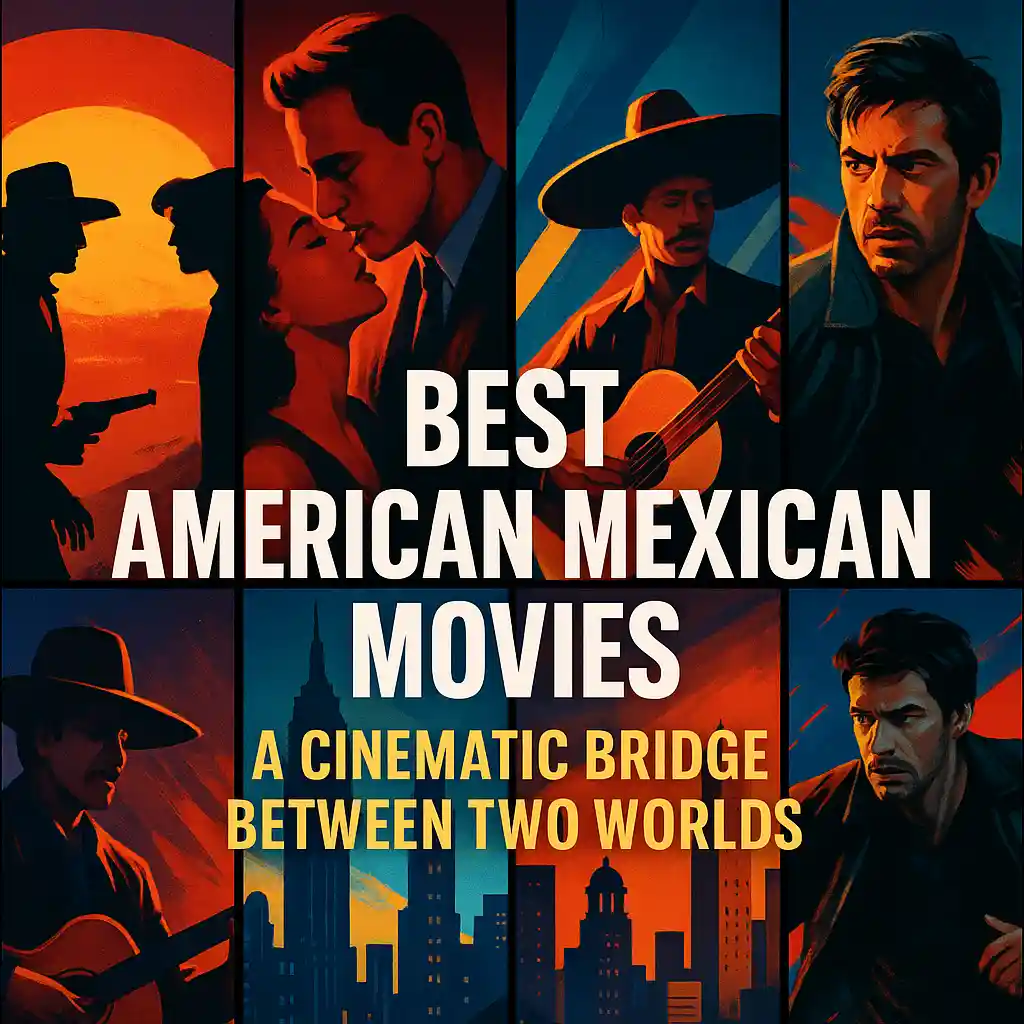
Brazilian cinema has a long and fascinating history, blending the rhythms of samba and bossa nova with complex stories of love, politics, and survival. For decades, directors have crafted films that reflect Brazil’s cultural richness and social struggles, capturing everything from carnival celebrations to the challenges of life in the favelas. The best Brazil movies not only entertain but also inspire deep reflection about identity, inequality, and resilience. With global recognition at Cannes, Berlin, and the Academy Awards, Brazilian movies continue to shape world cinema with their unique voice. Below is a carefully selected list of the top 25 Brazil movies you need to watch, featuring classics and contemporary gems that showcase why Brazilian movies remain essential viewing.
25 Best Brazil Movies
1. City of God (2002)
- Runtime: 130 min
- Starring: Alexandre Rodrigues, Leandro Firmino
- Director: Fernando Meirelles, Kátia Lund
- Genre: Crime, Drama
- IMDb Rating: 8.6
“City of God” is often hailed as the crown jewel of Brazil movies, telling the story of organized crime’s rise in the favelas of Rio de Janeiro. Its breathtaking cinematography, raw performances, and gripping narrative gave it legendary status worldwide. The film does not shy away from violence or poverty, but instead immerses viewers in a reality that is both shocking and heartbreaking. Brazilian movies had long been admired, but this film elevated them to new global recognition, earning countless awards and inspiring filmmakers across continents. It remains a touchstone for conversations about inequality and opportunity in urban Brazil, while demonstrating the kinetic style that has come to define many modern Brazilian movies.
2. Central Station (1998)
- Runtime: 113 min
- Starring: Fernanda Montenegro, Vinícius de Oliveira
- Director: Walter Salles
- Genre: Drama
- IMDb Rating: 8.0
“Central Station” tells the touching story of a retired schoolteacher who reluctantly helps a young boy search for his estranged father in rural Brazil. What begins as a reluctant duty becomes a transformative journey through landscapes, memory, and conscience. Montenegro’s performance was so powerful it earned her an Academy Award nomination, making this one of the most internationally respected Brazilian movies of all time. The film’s quiet emotional strength continues to resonate with audiences who value storytelling rooted in humanity and compassion. As one of the definitive Brazil movies of the 1990s, it bridges arthouse aesthetics with mainstream empathy, proving why Brazilian movies captivate viewers far beyond Latin America.
3. Elite Squad (2007)
- Runtime: 115 min
- Starring: Wagner Moura, André Ramiro
- Director: José Padilha
- Genre: Action, Crime, Drama
- IMDb Rating: 8.0
Winner of the Golden Bear at the Berlin Film Festival, “Elite Squad” is a gripping exploration of Rio’s violent drug wars, corruption, and morality. The film follows Captain Nascimento, a BOPE officer torn between duty, justice, and his own conscience, as he navigates an ethically fraught battlefield. Known for its raw intensity, “Elite Squad” became a benchmark for Brazil movies dealing with crime and law enforcement. Controversial yet impactful, it sparked debates about police brutality and social inequality in Brazil. Its unflinching style, sharp voice-over, and tense set pieces solidified it as one of the most discussed Brazilian movies of the 21st century.
4. Black Orpheus (1959)
- Runtime: 107 min
- Starring: Breno Mello, Marpessa Dawn
- Director: Marcel Camus
- Genre: Drama, Romance
- IMDb Rating: 7.5
Set during Rio’s vibrant Carnival, “Black Orpheus” retells the Greek myth of Orpheus and Eurydice with breathtaking visuals and a timeless soundtrack. Its samba rhythms and colorful imagery captured international audiences, winning both the Palme d’Or and the Academy Award for Best Foreign Language Film. Few Brazil movies have had such an enduring influence, introducing global viewers to the magic of Brazilian culture and music. Decades later, it remains a cinematic masterpiece filled with romance, tragedy, and the spirit of Rio. This classic helped cement the global appeal of Brazilian movies long before the modern festival era.
5. Neighboring Sounds (2012)
- Runtime: 131 min
- Starring: Irandhir Santos, Gustavo Jahn
- Director: Kleber Mendonça Filho
- Genre: Drama, Thriller
- IMDb Rating: 7.1
A modern urban drama, “Neighboring Sounds” examines class divides, paranoia, and insecurity in the city of Recife. The film’s unsettling atmosphere builds tension slowly, reflecting the quiet yet powerful anxieties of urban life. Brazilian movies often focus on poverty or violence, but this film addresses the subtler dynamics of privilege and fear behind gated buildings and private security. Its intelligent storytelling established Mendonça Filho as one of the most important new voices in Brazil cinema. The result is a hushed, hypnotic portrait of a neighborhood where wealth, nostalgia, and power collide.
6. Bacurau (2019)
- Runtime: 131 min
- Starring: Sônia Braga, Udo Kier
- Director: Kleber Mendonça Filho, Juliano Dornelles
- Genre: Drama, Mystery, Western
- IMDb Rating: 7.4
Part thriller, part western, “Bacurau” is one of the most daring Brazil movies of recent years. Set in a remote village that mysteriously disappears from maps, the story unfolds with surreal, violent, and political undertones. A Cannes Jury Prize winner, the film blends folklore, genre cinema, and resistance, capturing the resilience of Brazilian communities. Brazilian movies rarely combine genres so boldly, making “Bacurau” a standout piece of 21st-century cinema. It’s a fierce, communal anthem against exploitation and erasure, and a testament to why Brazilian movies feel so urgent today.
7. The Second Mother (2015)
- Runtime: 112 min
- Starring: Regina Casé, Camila Márdila
- Director: Anna Muylaert
- Genre: Drama
- IMDb Rating: 7.8
“The Second Mother” is a poignant exploration of family, class, and love. It follows Val, a live-in housemaid whose estranged daughter comes to stay, disrupting the fragile balance of her employers’ household and exposing invisible boundaries. Through its gentle yet sharp storytelling, the film challenges ideas of privilege, motherhood, and belonging. Among Brazil movies, it stands out for its subtle humor, touching performances, and incisive social observation. It’s a tender, humane story that helped broaden international appreciation for contemporary Brazilian movies.
8. Carandiru (2003)
- Runtime: 145 min
- Starring: Luiz Carlos Vasconcelos, Rodrigo Santoro
- Director: Hector Babenco
- Genre: Crime, Drama
- IMDb Rating: 7.5
Based on the real-life accounts of a doctor working in São Paulo’s infamous Carandiru prison, this film confronts injustice, overcrowding, and the search for dignity behind bars. The narrative builds toward the tragic 1992 massacre, making it one of the most haunting Brazil movies ever produced. Brazilian movies frequently explore themes of inequality, but “Carandiru” delivers them in unflinching, heartbreaking detail. Babenco’s mosaic of lives under pressure is both empathetic and enraging, a stark reminder of systemic failures.

9. Macunaíma (1969)
- Runtime: 110 min
- Starring: Grande Otelo, Paulo José
- Director: Joaquim Pedro de Andrade
- Genre: Comedy, Fantasy
- IMDb Rating: 7.2
A cornerstone of Cinema Novo, “Macunaíma” is a surreal, satirical tale about identity and transformation. Adapted from Mário de Andrade’s classic novel, it follows a shapeshifting antihero on bizarre adventures across Brazil. Unlike many Brazilian movies grounded in realism, “Macunaíma” embraces absurdity and myth to reflect on national character. Its colorful, chaotic energy and political playfulness make it a cult favorite. Few Brazil movies feel as wild, mischievous, and revealing.
10. Pixote (1981)
- Runtime: 128 min
- Starring: Fernando Ramos da Silva, Marília Pêra
- Director: Hector Babenco
- Genre: Crime, Drama
- IMDb Rating: 8.0
“Pixote” follows a street child caught in a relentless cycle of survival in São Paulo. Mixing professional actors with real street kids, the film captures a raw authenticity that shook audiences worldwide. This is one of the most painful Brazil movies to watch, yet also one of the most important, shedding light on the lives of the marginalized. Babenco crafts an unsentimental portrait that lingers long after the credits, underscoring the social conscience that runs through many Brazilian movies.
11. The Man Who Copied (2003)
- Runtime: 123 min
- Starring: Lázaro Ramos, Leandra Leal
- Director: Jorge Furtado
- Genre: Comedy, Crime, Drama
- IMDb Rating: 7.6
Mixing romance, comedy, and crime, “The Man Who Copied” centers on a photocopy operator in Porto Alegre whose longing for love and wealth nudges him into risky schemes. Furtado’s brisk, witty style makes social commentary go down easy, while the plot tightens like a caper. It’s one of the most accessible Brazil movies of the 2000s, balancing charm and critique. A playful entry that still asks pointed questions about class and aspiration in Brazilian movies.
12. Aquarius (2016)
- Runtime: 146 min
- Starring: Sônia Braga
- Director: Kleber Mendonça Filho
- Genre: Drama
- IMDb Rating: 7.5
“Aquarius” stars the legendary Sônia Braga as a retired music critic resisting developers intent on erasing her beachfront building—and her memories. The fight becomes a quiet epic about dignity, gentrification, and the archives we carry within. Critically acclaimed at Cannes, it helped renew global fascination with serious Brazilian movies. Braga’s magnetic performance anchors a story that listens closely to the whispers of place, history, and self-determination.
13. Trash (2014)
- Runtime: 114 min
- Starring: Rooney Mara, Wagner Moura, Selton Mello
- Director: Stephen Daldry
- Genre: Adventure, Crime, Drama
- IMDb Rating: 7.1
Shot in Rio’s favelas with a lively mix of local actors and international talent, “Trash” follows three boys whose discovery of a wallet drags them into a web of corruption. Daldry blends suspense and social critique with a youthful sense of possibility. As a crossover title, it drew global attention to issues that many Brazil movies examine from the inside. It’s propulsive, heartfelt, and accessible, inviting fresh audiences into Brazilian narratives.
14. Estômago (2007)
- Runtime: 113 min
- Starring: João Miguel, Fabiula Nascimento
- Director: Marcos Jorge
- Genre: Comedy, Drama
- IMDb Rating: 7.8
“Estômago” traces a poor man’s discovery that culinary talent can be a ladder—both in restaurants and in prison. Its dual timelines serve a savory blend of dark humor and social allegory, with dishes plated like power moves. Among Brazil movies about class and desire, this one is uniquely flavorful and sly. By the time its final course is served, the film has cooked a sharp parable about hunger—in every sense of the word.
15. Linha de Passe (2008)
- Runtime: 113 min
- Starring: Sandra Corveloni, Vinícius de Oliveira
- Director: Walter Salles, Daniela Thomas
- Genre: Drama
- IMDb Rating: 7.2
Following four brothers and their mother in São Paulo, “Linha de Passe” is a tightly observed portrait of working-class resilience. Football dreams, religious longing, and daily grind intersect in lives searching for a route out. Salles and Thomas craft a humane tapestry where small choices echo loudly. Corveloni’s Cannes-winning turn underscores the quiet power of Brazil movies that prize empathy over spectacle.
16. Araby (2017)
- Runtime: 97 min
- Starring: Aristides de Sousa
- Director: Affonso Uchoa, João Dumans
- Genre: Drama
- IMDb Rating: 7.3
“Araby” opens with a boy and a found diary, then unfurls into the life of a factory worker drifting across jobs and loves. It’s patient, lyrical, and attentive to textures of labor—sunlight on roads, the weight of tools, the ache of farewells. One of the most quietly profound Brazilian movies of the decade, it dignifies the overlooked. A road movie of the soul where every mile matters.
17. O Pagador de Promessas (1962)
- Runtime: 95 min
- Starring: Leonardo Villar, Glória Menezes
- Director: Anselmo Duarte
- Genre: Drama
- IMDb Rating: 7.8
Also known as “The Given Word,” this Palme d’Or winner follows a man honoring a vow to carry a cross to a church after his donkey heals. Bureaucracy, religious gatekeeping, and media circus turn a humble act into public conflict. A landmark among classic Brazil movies, it examines faith colliding with institutions. Its moral clarity and human scale keep it potent decades later.

18. Terra em Transe (1967)
- Runtime: 110 min
- Starring: Jardel Filho, Paulo Autran
- Director: Glauber Rocha
- Genre: Drama, Fantasy
- IMDb Rating: 7.2
Glauber Rocha’s “Entranced Earth” is a feverish political allegory from the heart of Cinema Novo. Poetry and polemic blur as a journalist navigates power, propaganda, and betrayal. The film’s experimental rhetoric made it controversial and essential in equal measure. Few Brazilian movies speak this boldly about the machinery of rule and resistance. It’s radical cinema that still crackles with electricity.
19. The Year My Parents Went on Vacation (2006)
- Runtime: 110 min
- Starring: Michel Joelsas, Germano Haiut
- Director: Cao Hamburger
- Genre: Drama
- IMDb Rating: 7.5
Set in 1970 under dictatorship—and amid World Cup frenzy—this tender tale follows a boy left with his grandfather when his activist parents vanish. Childhood rituals play out in a Jewish neighborhood alive with soccer dreams and political whispers. It’s one of the most empathetic Brazil movies, attentive to how history reshapes the ordinary. Nostalgia, grief, and hope mingle in a film that invites families to talk across generations.
20. Bye Bye Brazil (1980)
- Runtime: 110 min
- Starring: José Wilker, Betty Faria
- Director: Carlos Diegues
- Genre: Comedy, Drama, Romance
- IMDb Rating: 7.4
Diegues’s bittersweet road movie trails a troupe of traveling performers meeting TV antennas and paved roads that threaten their livelihood. Part love letter, part elegy, it captures a Brazil tilting between tradition and modernity. Music and mischief abound, but so does a gentle melancholy. Among Brazilian movies, it’s an enduring snapshot of cultural change on the move.
21. The Way He Looks (2014)
- Runtime: 96 min
- Starring: Ghilherme Lobo, Fabio Audi, Tess Amorim
- Director: Daniel Ribeiro
- Genre: Drama, Romance
- IMDb Rating: 7.9
This tender coming-of-age romance follows Leonardo, a blind teen seeking independence, friendship, and first love. Shot with luminous simplicity, it offers a quietly revolutionary portrait of desire and agency. As a festival favorite, it broadened international perceptions of what Brazilian movies can be—gentle, inclusive, and joyful. A small film with a big, generous heart.
22. Limite (1931)
- Runtime: 120 min
- Starring: Taciana Rei, Olga Breno
- Director: Mário Peixoto
- Genre: Experimental, Drama
- IMDb Rating: 7.6
Considered one of the greatest silent films in world cinema, “Limite” is a visionary meditation on existence and freedom. Its cascading images—hands bound, ocean swells, faces in reverie—compose pure visual music. Long neglected, it’s now a cornerstone for understanding early Brazilian movies. Non-narrative yet intoxicating, it proves cinema can be memory, dream, and tide.
23. Dona Flor and Her Two Husbands (1976)
- Runtime: 110 min
- Starring: Sônia Braga, José Wilker
- Director: Bruno Barreto
- Genre: Comedy, Romance, Fantasy
- IMDb Rating: 7.2
Adapted from Jorge Amado’s beloved novel, this sensual comedy casts Sônia Braga as Dona Flor, torn between her staid new spouse and the ghost of her raucous first husband. Spicy, mischievous, and irresistibly fun, it became one of the biggest domestic hits of its era. Its playful supernatural twist and star power made it a gateway to classic Brazilian movies for many viewers.
24. Seashore (2015)
- Runtime: 83 min
- Starring: Mateus Almada, Maurício Barcellos
- Director: Filipe Matzembacher, Marcio Reolon
- Genre: Drama, Romance
- IMDb Rating: 6.8
Set in southern Brazil, “Seashore” paints a hushed portrait of two teens navigating grief, sexuality, and the fragile terms of closeness. Sun-bleached frames and naturalistic performances invite intimacy over melodrama. As part of a more delicate, personal wave of Brazilian movies, it shows how small stakes can feel immense. A whisper of a film that lingers like salt air.
25. My Name Isn’t Johnny (2008)
- Runtime: 122 min
- Starring: Selton Mello, Cléo Pires
- Director: Mauro Lima
- Genre: Biography, Crime, Drama
- IMDb Rating: 7.1
Based on the true story of João Guilherme Estrella, a charming middle-class Carioca who becomes a cocaine kingpin, this slick biopic blends swagger with hard lessons. Selton Mello’s charismatic turn keeps the rise fun and the fall sobering. As a Brazil movie, it captures contradictions between privilege and peril. A cautionary tale wrapped in party lights—very Rio, very human.
Frequently Asked Questions about Brazil Movies
Q1: What is the most famous Brazilian movie worldwide?
Q2: What themes are common in Brazil movies?
Q3: Do Brazilian movies win international awards?
Q4: Where can I watch Brazilian movies?
Conclusion: Why Brazil Movies Deserve Your Attention
From the kinetic urgency of “City of God” to the lyrical grace of “Limite,” Brazil movies offer a spectrum of styles and sensibilities that few national cinemas can match. These films open windows onto Rio’s hillsides, Recife’s high-rises, São Paulo’s sprawl, and quiet rural roads where memory and myth entwine. Whether you prefer genre-bending thrills like “Bacurau,” tender coming-of-age tales like “The Way He Looks,” or political essays like “Terra em Transe,” Brazilian movies deliver bold voices and unforgettable images. Dive into this list to experience a cinema that dances between melancholy and celebration, critique and affection, and discover stories that stay with you long after the credits roll.






